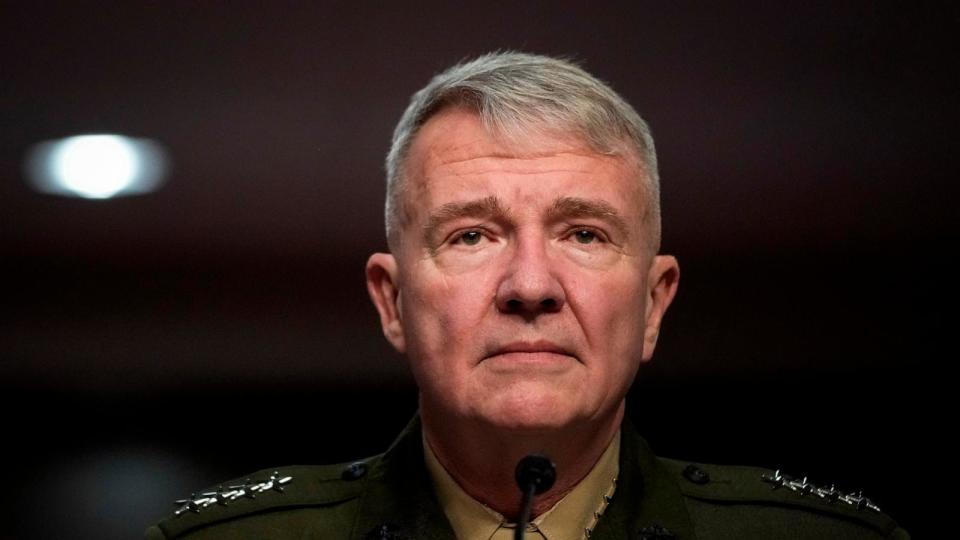Former top general warns of 'inevitable' threats to US from Islamic State in wake of Moscow attack
The Islamic State terror group has a "strong desire" to attack the U.S. and other foreign powers, the former head of U.S. Central Command warned on Sunday, calling it a threat that is only growing.
"We should believe them when they say that. They're going to try to do it," retired Gen. Frank McKenzie told ABC News' "This Week" co-anchor Martha Raddatz.
"I think the threat is growing," McKenzie continued, pointing to the dangers from affiliates like ISIS-K after the broader group took responsibility for a deadly attack in Moscow earlier this month.The group also said it was behind a mass bombing in Iran in January.
"It begun to grow as soon as we left Afghanistan, it took pressure off ISIS-K. So I think we should expect further attempts of this nature against the United States as well as our partners and other nations abroad," McKenzie said. "I think this is inevitable."
McKenzie, who is also the author of the upcoming "The Melting Point," a book about leadership and his time commanding U.S. forces in the Middle East, which included the exit from Afghanistan, said that the U.S. maintains a large enough military presence in Iraq and Syria to counter extremists there.
But he still believes the U.S. should have kept a small troop presence in Afghanistan rather than withdrawing completely in August 2021, bringing an end to America's longest war.
Though President Joe Biden has previously maintained there would be an "over-the-horizon capability" to "act quickly and decisively" in Afghanistan, even from afar, McKenzie disputed that.
"In Afghanistan, we have almost no ability to see into that country and almost no ability to strike into that country," he said of the conditions on the ground now.
That is a boon to the Islamic State and similar such militants, he said.
"If you can keep pressure on them ... in their homeland and their base, it makes it hard for them to conduct these types of attacks," he said. "Unfortunately, we no longer place that pressure on them, so they're free to gain strength, they're free to plan, they're free to coordinate."
Had the U.S. and its allies kept some forces in Afghanistan, prolonging military involvement there, "I have to believe, Martha, that things would be different. ... I think we might actually be safer than we are," McKenzie said.

The attack in Russia on March 22 underscores one of the dangers of militants being able to regroup enough to plan out large-scale operations, McKenzie said. At the same time, such efforts are more easily detectable, he said.
The U.S. has said it alerted the Kremlin to just such a possible terror attack weeks ahead of time, adhering to the "duty to warn" principle.
"I think there was probably good opportunity for the Russians to have averted this attack had they actually listened to the material that was presented to 'em," McKenzie said on Sunday.
The suspects in the Moscow attack -- who have been identified as citizens of Tajikistan -- opened fire in one of the largest shopping and entertainment complexes in Russia, which was followed by a fire that engulfed the complex, according to the Russian Foreign Security Service.
McKenzie told Raddatz on "This Week" that militants can become radicalized to fight for groups like ISIS-K through influence campaigns and online methods or through in-person recruitment and training -- but that self-radicalization "may be one of the most dangerous methods that ISIS can use to generate attacks."
"Those attacks are generally not going to be well coordinated, they're not going to be well planned and they're not going to be well supported. But they could be very lethal because they'll be so hard to detect," he said.
Separately, McKenzie also briefly gave his view on the challenges that the Israeli military is facing as it targets Hamas fighters in Gaza in the wake of Hamas' Oct. 7 terror attack.
The mounting casualties amid the fighting -- more than 32,000 in Gaza, according to the Hamas-run health ministry -- have provoked increasing international outcry.
"I think the Israelis are in genuine horns of a dilemma as they try to finish the ground campaign in Gaza," McKenzie said, "and it's going to be a very difficult stretch for them."
Former top general warns of 'inevitable' threats to US from Islamic State in wake of Moscow attack originally appeared on abcnews.go.com


